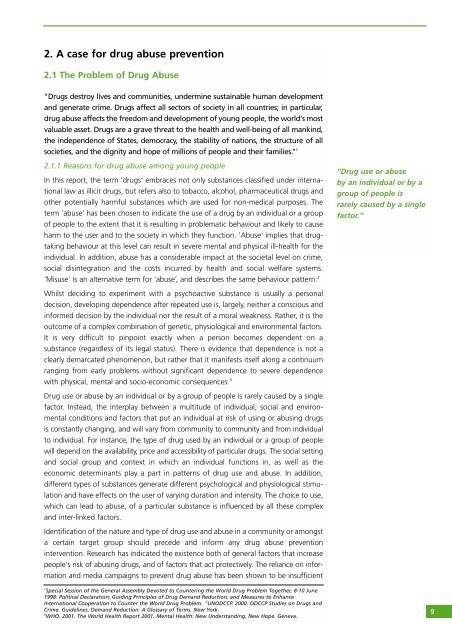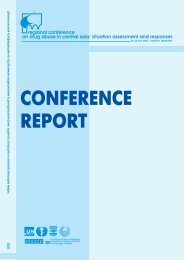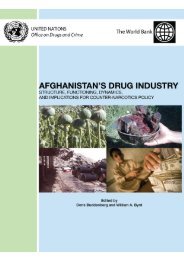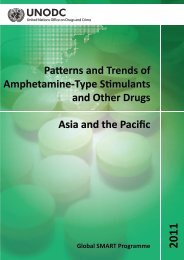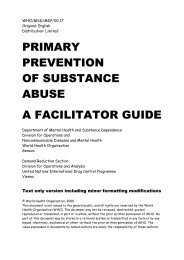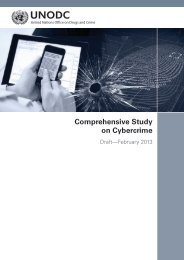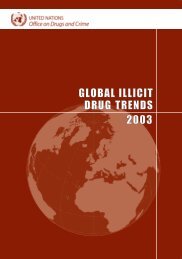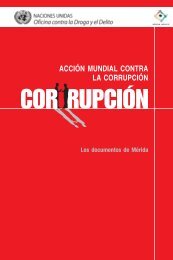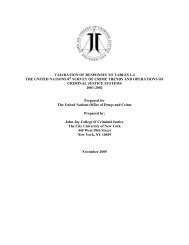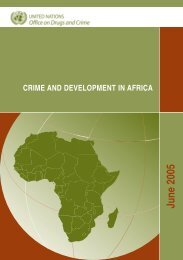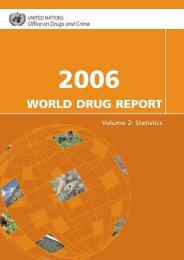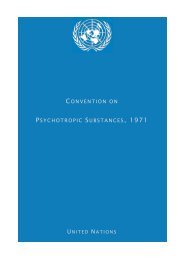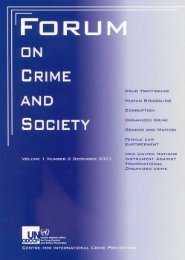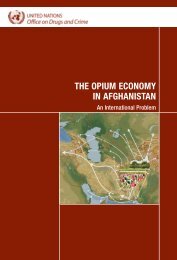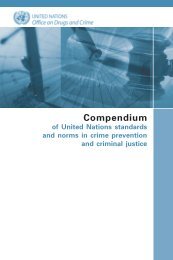PDF (Lessons learned in drug abuse prevention: a global review)
PDF (Lessons learned in drug abuse prevention: a global review)
PDF (Lessons learned in drug abuse prevention: a global review)
You also want an ePaper? Increase the reach of your titles
YUMPU automatically turns print PDFs into web optimized ePapers that Google loves.
2. A case for <strong>drug</strong> <strong>abuse</strong> <strong>prevention</strong><br />
2.1 The Problem of Drug Abuse<br />
"Drugs destroy lives and communities, underm<strong>in</strong>e susta<strong>in</strong>able human development<br />
and generate crime. Drugs affect all sectors of society <strong>in</strong> all countries; <strong>in</strong> particular,<br />
<strong>drug</strong> <strong>abuse</strong> affects the freedom and development of young people, the world's most<br />
valuable asset. Drugs are a grave threat to the health and well-be<strong>in</strong>g of all mank<strong>in</strong>d,<br />
the <strong>in</strong>dependence of States, democracy, the stability of nations, the structure of all<br />
societies, and the dignity and hope of millions of people and their families." 1<br />
2.1.1 Reasons for <strong>drug</strong> <strong>abuse</strong> among young people<br />
In this report, the term '<strong>drug</strong>s' embraces not only substances classified under <strong>in</strong>ternational<br />
law as illicit <strong>drug</strong>s, but refers also to tobacco, alcohol, pharmaceutical <strong>drug</strong>s and<br />
other potentially harmful substances which are used for non-medical purposes. The<br />
term '<strong>abuse</strong>' has been chosen to <strong>in</strong>dicate the use of a <strong>drug</strong> by an <strong>in</strong>dividual or a group<br />
of people to the extent that it is result<strong>in</strong>g <strong>in</strong> problematic behaviour and likely to cause<br />
harm to the user and to the society <strong>in</strong> which they function. 'Abuse' implies that <strong>drug</strong>tak<strong>in</strong>g<br />
behaviour at this level can result <strong>in</strong> severe mental and physical ill-health for the<br />
<strong>in</strong>dividual. In addition, <strong>abuse</strong> has a considerable impact at the societal level on crime,<br />
social dis<strong>in</strong>tegration and the costs <strong>in</strong>curred by health and social welfare systems.<br />
'Misuse' is an alternative term for ‘<strong>abuse</strong>’, and describes the same behaviour pattern. 2<br />
Whilst decid<strong>in</strong>g to experiment with a psychoactive substance is usually a personal<br />
decision, develop<strong>in</strong>g dependence after repeated use is, largely, neither a conscious and<br />
<strong>in</strong>formed decision by the <strong>in</strong>dividual nor the result of a moral weakness. Rather, it is the<br />
outcome of a complex comb<strong>in</strong>ation of genetic, physiological and environmental factors.<br />
It is very difficult to p<strong>in</strong>po<strong>in</strong>t exactly when a person becomes dependent on a<br />
substance (regardless of its legal status). There is evidence that dependence is not a<br />
clearly demarcated phenomenon, but rather that it manifests itself along a cont<strong>in</strong>uum<br />
rang<strong>in</strong>g from early problems without significant dependence to severe dependence<br />
with physical, mental and socio-economic consequences. 3<br />
Drug use or <strong>abuse</strong> by an <strong>in</strong>dividual or by a group of people is rarely caused by a s<strong>in</strong>gle<br />
factor. Instead, the <strong>in</strong>terplay between a multitude of <strong>in</strong>dividual, social and environmental<br />
conditions and factors that put an <strong>in</strong>dividual at risk of us<strong>in</strong>g or abus<strong>in</strong>g <strong>drug</strong>s<br />
is constantly chang<strong>in</strong>g, and will vary from community to community and from <strong>in</strong>dividual<br />
to <strong>in</strong>dividual. For <strong>in</strong>stance, the type of <strong>drug</strong> used by an <strong>in</strong>dividual or a group of people<br />
will depend on the availability, price and accessibility of particular <strong>drug</strong>s. The social sett<strong>in</strong>g<br />
and social group and context <strong>in</strong> which an <strong>in</strong>dividual functions <strong>in</strong>, as well as the<br />
economic determ<strong>in</strong>ants play a part <strong>in</strong> patterns of <strong>drug</strong> use and <strong>abuse</strong>. In addition,<br />
different types of substances generate different psychological and physiological stimulation<br />
and have effects on the user of vary<strong>in</strong>g duration and <strong>in</strong>tensity. The choice to use,<br />
which can lead to <strong>abuse</strong>, of a particular substance is <strong>in</strong>fluenced by all these complex<br />
and <strong>in</strong>ter-l<strong>in</strong>ked factors.<br />
Identification of the nature and type of <strong>drug</strong> use and <strong>abuse</strong> <strong>in</strong> a community or amongst<br />
a certa<strong>in</strong> target group should precede and <strong>in</strong>form any <strong>drug</strong> <strong>abuse</strong> <strong>prevention</strong><br />
<strong>in</strong>tervention. Research has <strong>in</strong>dicated the existence both of general factors that <strong>in</strong>crease<br />
people's risk of abus<strong>in</strong>g <strong>drug</strong>s, and of factors that act protectively. The reliance on <strong>in</strong>formation<br />
and media campaigns to prevent <strong>drug</strong> <strong>abuse</strong> has been shown to be <strong>in</strong>sufficient<br />
“Drug use or <strong>abuse</strong><br />
by an <strong>in</strong>dividual or by a<br />
group of people is<br />
rarely caused by a s<strong>in</strong>gle<br />
factor.”<br />
1<br />
Special Session of the General Assembly Devoted to Counter<strong>in</strong>g the World Drug Problem Together, 8-10 June<br />
1998: Political Declaration; Guid<strong>in</strong>g Pr<strong>in</strong>ciples of Drug Demand Reduction; and Measures to Enhance<br />
International Cooperation to Counter the World Drug Problem. 2 UNODCCP. 2000. ODCCP Studies on Drugs and<br />
Crime. Guidel<strong>in</strong>es. Demand Reduction: A Glossary of Terms. New York.<br />
3<br />
WHO. 2001. The World Health Report 2001. Mental Health: New Understand<strong>in</strong>g, New Hope. Geneva.<br />
9


